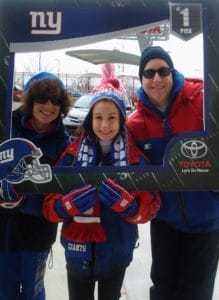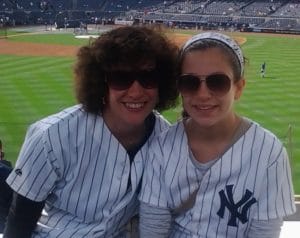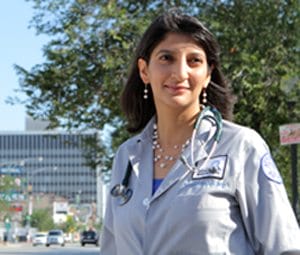I come from a family of avid sports fans. My husband is a huge Yankee baseball fan and my parents and I are die-hard New York Giants football fans. We have had season tickets to the Giants for years. I grew up attending Giants games and cheering for Big Blue, making lifelong memories with my family.
Before my daughter, Patricia, was even born, she received a Yankee outfit, a Giants football Jersey, Yankee and Giants baby bottles, and stuffed animals adorned in each team’s hats and colors. Patricia learned that being a member of our family meant being a Giants and Yankees fan.
Patricia, who is now a teenager, was diagnosed with multiple food allergies at the age of nine months. She is allergic to wheat, eggs, fish, tree nuts, peanuts, oats, rye, barley, peas, green beans and sesame seeds. After receiving the life-changing diagnosis, my husband and I were determined that she would live a complete life, while safely managing her food allergies. In our family you know by now what that means: attending Yankee baseball games and Giants football games.
Patricia has safely attended sporting events since she was 3 years old (I warned you we were serious fans). Here is how we do it: we bring safe food for Patricia to consume throughout the game. The football games are great because, we make her safe meals at our family tailgate parties before Giants home games. We carry our epinephrine auto-injectors and Benadryl with us, and we always have a physician-signed copy of Patricia’s food allergy action plan with us.
Prior to attending a game, we follow these 5 simple steps:
- We contact the stadium’s Disabled Services Department or Guest Services Department and inform them of Patricia’s multiple food allergies. We ask for an e-mail address and phone number of someone in stadium management so that we can correspond with them prior to attending the game.
- We inform stadium personnel of our seat location (section, row, and seat number).
- We also inform stadium officials of our daughter’s food allergies and of the fact that they she will be bringing in safe food to consume during the game. (Remember to check the stadium’s bag policy before you attend the game. Each stadium or league may have different requirements for the size or time of bag that a person can carry into the facility.)
- We also inform stadium officials that we will carry Benadryl and our epinephrine auto-injectors into the game.
- Finally, we ask our stadium contact to inform any onsite medical personnel of our seat location in case we have an emergency and have to administer epinephrine during the game.
Keeping the stadium in the loop is well worth the effort. Making contact with the Disabled Services Department or Guest Services Department allows you to have a contact name at the stadium during the game. If an emergency should arise, you can approach an usher or stadium official and use the name of your stadium contact to get help more quickly.
If you have an issue with bringing in safe food during stadium check in, or a security officer questions you bringing in medicine or an epinephrine auto-injector, you can pull out your e-mail from the stadium official whom you have informed about your child’s food allergy. Finally, this process allows you and your child the chance to develop a personal relationship with stadium officials. Our family has a special bond with the usher in our section at Giants games and with the Disabled Services Departments at both MetLife and Yankee Stadium.
Now that Patricia is a teenager, we are letting her write the e-mails to stadium officials – so she that she can continue to take responsibility of her allergies as she grows.
 The Giuriceo family
The Giuriceo family We understand that many allergens are present at a sporting event, but we wipe down the seats before our daughter sits in them, and she only eats safe food from home or food that is packaged and clearly labeled.
We also instituted this family rule: “No flip flops are allowed to be worn at any stadium; only closed toes shoes like sneakers are acceptable for game days.” We do this so that she does not get a contact reaction from allergens on the ground, like peanut shells.
These procedures have worked for our family and the management of Patricia’s food allergies. Always check with your own allergist or physician to see if your food-allergic child can safely attend a sporting event, and whether there are any additional steps that you should follow.
We have also safely cheered our teams on at Fenway Park and Camden Yards. Each time we followed the same steps set out above. Patricia continues to follow in the family tradition of cheering for the Big Blue and the Bronx Bombers, and does so while safely managing her food allergies.
We are happy to share our tips with fans of all teams and sports. Here’s to the love of the game and happy family memories!
Lisa Giuriceo is the Facilitator of The Food Allergy and Asthma Support Group of North Jersey.
Read more:
Finding the Silver Lining of a Food Allergy Diagnosis
Accidental Allergy Exposure: From Fear to First Injection and Big Life Lessons
Cashew-Containing Kale Chip Teaches EMT That He’s Not Invincible






